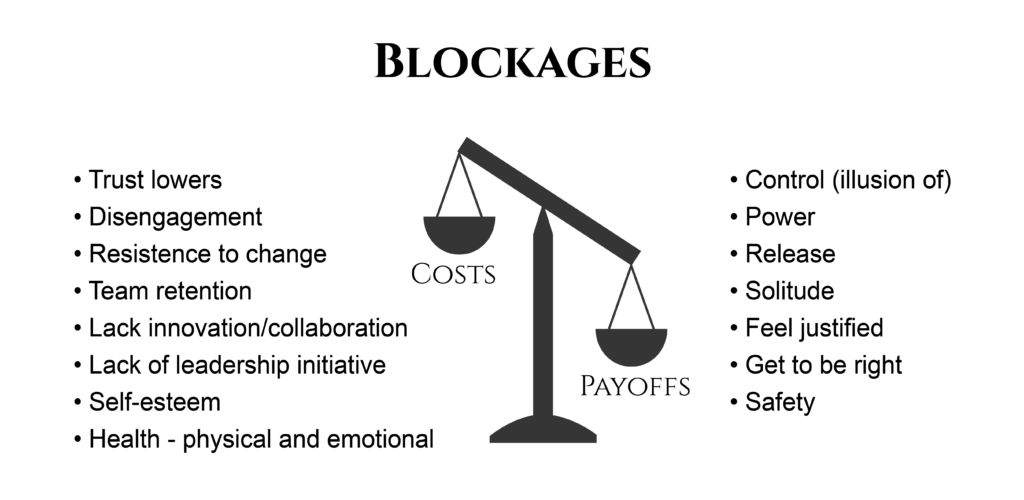How Teams Unconsciously Sabotage Results

Have you ever been driving a car headed towards your new home, having recently moved, only to find yourself suddenly turning down the familiar street towards your old home? How did that happen?
I’ll tell you how. You were so busy thinking about something else – your conscious mind was so “off-line” – that your unconscious took over for you. Your unconscious mind made the choice for you because you weren’t paying attention. It may feel like there was no choice made at that moment, but at some level, there was a choice, because there you are, at your old house! It happens to all of us.
Like how autopilot takes over when driving distracted, many of us are leading our teams and organizations by making decisions on autopilot.
Our lives, both personally and professionally, and our organizations, are the reflection of the sum of the choices we’ve made over time, and the choices we continue to make every day – including our unconscious choices.
If left unchecked, over time, our choices can become blockages, sabotaging our best efforts to get ahead.
Unconscious Choices Block Results
Blockages are things we do and wish we didn’t, or ways we sometimes feel that we wish we didn’t, or ways we think that we know are limiting. The problem isn’t that we do/say/feel these ways, it’s when we do/say/feel those things too often, to our own detriment, that it becomes a problem. The problem becomes worse when you know you need to stop but don’t know how.
So, here’s my question: If we can see this stuff isn’t working for us, why do we keep choosing to do it?
Would we continue to invest in a stock year after year if it never produced a profit or a dividend financially? Of course not. So why do we keep investing, emotionally, in behaviors, thoughts, and feelings that only seem to hurt us?
We keep doing this stuff because we’re getting a payoff!
We’re not stupid, we’re getting something out of it. If we can figure out what that payoff is, then we can try a better way to get the same payoff without paying the same prices.
Every Choice Has A Payoff
Let’s look at the relationship between these patterns of decision making and their payoffs.
We make cost/benefit analyses internally and impulsively before we act, even if we are unaware of it. Unconsciously, we consider the costs and benefits for everything we do and think, and we are masters at rationalizing our choices.
Have you ever tried to justify a past business decision and not really known why you made it? Most likely you were looking for a short-term payoff, usually in the form of stress relief in the moment or an escape from the negative emotions. It’s human nature.
The trick is to figure out consciously what we’re seeking unconsciously so we can change it before we sabotage our results.
Let’s take the example of micro-managing:
Everybody hates this tedious “management style.” It undermines team morale, employee engagement, the leader’s credibility, and blocks creative problem-solving and initiative. Why, then, do so many people micro-manage, not only at the office but at home, on volunteer committees, in church groups and even dinner table discussions?
Because they’re scared. That’s usually always the reason. It just doesn’t feel like fear. It feels like control or perfectionism, which we can rationalize.
So many of us are scared that we’re not a “good enough” leader/parent/colleague/friend that our defense is to try harder and paddle faster to keep or regain our control.
It’s a valid perspective that micro-managing can, sometimes, be effective. If I was having a critical surgery, I would want the surgeon opening me up to micro-manage the hell out of the process! But there is a balance to be achieved, as in when, where and how much pressure to apply to produce the most effective return in both the long and the short -term?
It is this skill of discernment – that can only develop from reflection and self-examination – that fosters choices that take people from being good leaders to resilient leaders.
The diagram below contains the most common, universal prices and payoffs for micro-managing.

Ask yourself, what does the behavior cost you? What does it cost your team or family? And what do you get out of it? Those are the first questions to ask to determine better ways to get the same rewards.
Look at that juicy pile of payoffs. Are any of these things wrong to want? No. Who doesn’t want to feel powerful, in control and self-confident? All of us want those things. The question is, how are we generating those emotional pay-offs, and at what cost to ourselves and those we lead?
Based on results, micromanagers want the experience of short-term control – and the price they pay is lowered team trust – more than they want an empowered team – which can only succeed if they give up some of their control and reach for the longer-term payoff.
When they finally choose to relinquish some of their control, they will not only see their employees improve their performances, but also that they reach their potential of the company.
Choose The Long-Term Payoff
Ineffective patterns of behavior are perpetuated by the payoffs they generate, often, on an emotional level. While this is human nature, if we wish to increase our resilience and gain real control, it is important to understand the connection between the prices we pay for the payoffs we seek. Once we get back on the track of thinking through things with long-term goals in mind, we are more likely to make wiser, more proactive, intentional choices as a result. When we go for short-term payoffs, we end up paying long-term prices. The trick is to flip that: Be willing to pay short-term prices for long-term payoffs.
What does this mean for your team? What are some choices your organization makes that get in the way of fully engaging all employees in delivering your objectives, strategy or mission (your business results)?
What are the things that happen that don’t support or drive a culture that best serves your organization?
